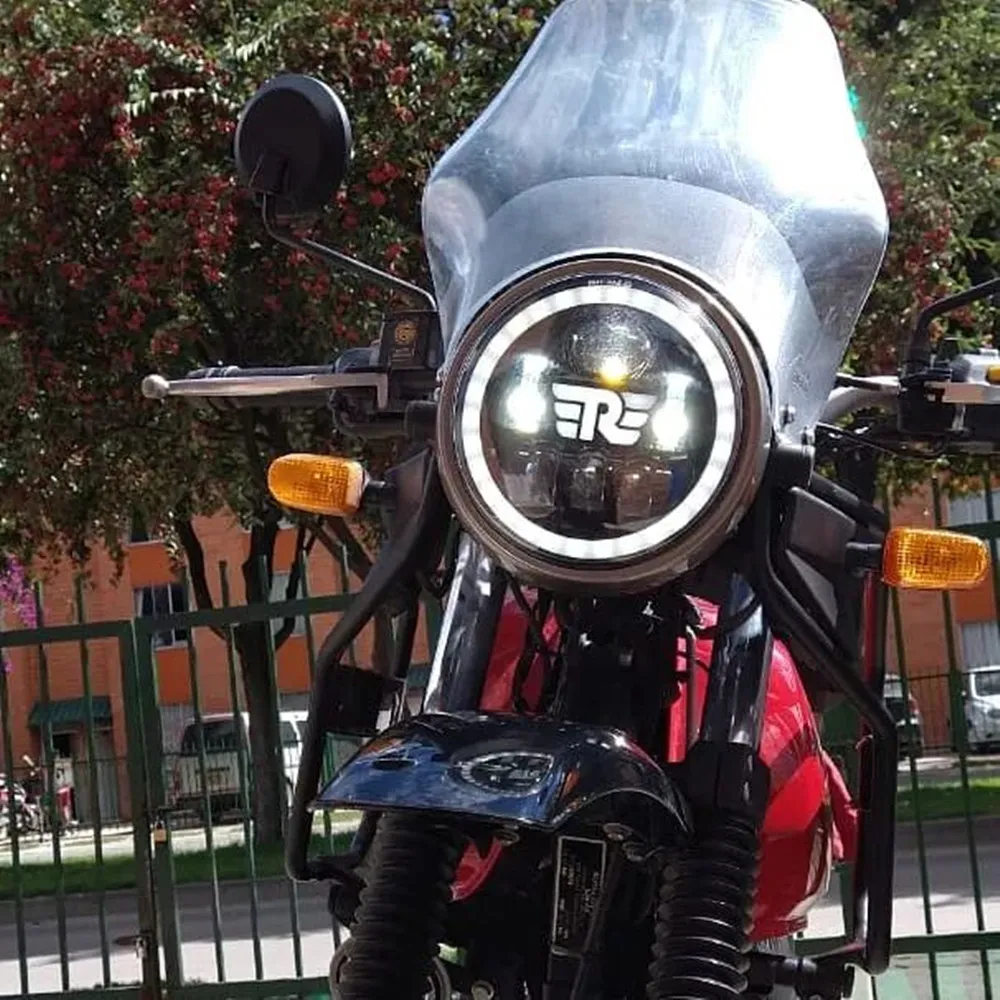Royal Enfield motorcycles—known for their classic heritage styling and strong road presence—use lighting systems that play a crucial role in both safety and aesthetics. Whether you ride a Classic 350, Bullet, Himalayan, or Interceptor 650, one common debate among owners is whether to stick with the factory halogen headlight or upgrade to a modern Royal Enfield led headlight system. This article breaks down the differences, advantages, and considerations to help you choose the best lighting option for your Royal Enfield.

1. Halogen Headlights: Traditional and Time-Tested
Halogen headlights have been the standard for decades on Royal Enfield motorcycles and many other bikes worldwide.
How They Work
Halogen bulbs use a heated tungsten filament inside a gas-filled chamber to produce light. They are simple, inexpensive, and easy to replace.
Advantages of Halogen
Warm light quality Halogen bulbs produce a warm yellowish beam (~3200K), which improves visibility in fog, rain, and dusty roads.
Low cost and wide availability Replacement bulbs are affordable and sold everywhere.
Compatibility Perfect fit for most Royal Enfield reflector housings without modification.
Easy to repair Even a roadside mechanic can replace a halogen bulb in minutes.
Disadvantages
Lower brightness compared to LEDs
Higher power consumption, drawing more energy from the battery
Shorter lifespan (usually 400–600 hours)
Heat production, which can stress the headlamp housing over time
2. LED Headlights: Modern, Efficient, and Stylish
LED (Light Emitting Diode) headlights have become extremely popular among Royal Enfield riders of Industry Mag seeking improved illumination and a modern look.
How LEDs Work
LEDs use semiconductor chips to produce light. They require much less power and are more durable.
Advantages of LED
Significantly brighter output Enhances night visibility and increases your presence on the road.
Cool white color temperature (6000K–6500K) Gives a premium, modern appearance.
Lower power draw Reduces strain on the battery and electrical system.
Very long lifespan Often lasts 10,000 hours or more.
Better beam pattern (with quality units) Projector-style LEDs provide a focused, controlled beam.
Disadvantages
Can cause glare if not aligned properly or installed in a halogen reflector
More expensive than halogen bulbs
In wet or foggy conditions the cool white light may perform slightly worse
Cheap aftermarket LEDs can malfunction or flicker
3. Which Performs Better on Royal Enfield Motorcycles?
Night Riding Performance
LED wins due to brighter illumination and wider spread.
Halogen can perform better in fog or rain thanks to its warmer color.
Battery Load
LED uses much less power (10–20W) compared to halogen (35–55W).
Aesthetic Appeal
LED undeniably gives the motorcycle a modern premium look.
Halogen suits riders who prefer the vintage classic vibe.
Beam Accuracy
OEM LED units or projector-style LED upgrades provide a clean cutoff line.
Halogen reflectors fitted with LED retrofit bulbs may cause scattered glare.
4. Safety Considerations
With Halogen
Safe and predictable performance.
Beam pattern designed for the reflector housing.
With LED
Safe only if installed correctly and aligned properly.
Poorly designed or misaligned LEDs can blind oncoming traffic.
5. What Royal Enfield Riders Typically Choose
Classic 350 / Bullet riders: Many stay with halogen due to the vintage retro look, but a growing number upgrade to 7-inch LED projector units.
Himalayan / Scram 411 riders: Prefer LED for adventure riding and better night penetration.
Interceptor 650 / Continental GT 650 riders: Frequently upgrade to LED for better visibility and a modern style match.
6. Final Recommendation: Halogen or LED?
Choose Halogen if you want:
A classic look
Better performance in foggy or dusty environments
Low-cost maintenance
Choose LED if you want:
Maximum brightness and visibility
Modern aesthetics
Longer lifespan and lower battery consumption
Verdict: For most Royal Enfield riders, a quality LED headlight upgrade offers the best blend of safety, performance, and visual appeal—as long as the beam pattern is well-designed and aligned correctly.